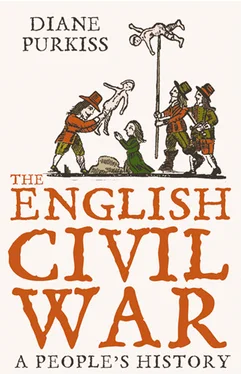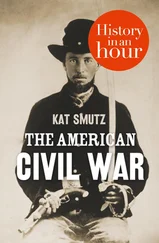London was wild with rumour and story. The undercurrent of dread, that sometimes threatened to rise and swamp the city, was the fear of popery. ‘Prentices and clubs’ became the call. The London apprentices in May 1640 threatened to rise against the Queen Mother Marie de Medici and Archbishop Laud. They marched, with a drummer at their head. Placards materialized everywhere, calling the apprentices to rid the city of the curse of bishops. Everyone was on holiday for May Day, so when the crowd of apprentices reached St George’s Fields, Southwark, it was augmented by sailors and dockhands, idle through lack of trade. They decided to hunt for ‘Laud, the fox’, and 500 of them marched on Lambeth Palace. The apprentices, balked because Laud had escaped, went instead to break open prisons, and to attack the house of the Earl of Arundel. A rumour swept London that 50,000 Frenchmen were already hidden away in the city’s suburbs, ready to spring out and support the king, and overthrow true religion. On 21 May, the judges declared the disturbances were high treason, and John Archer, a glover of Southwark, was brutally tortured before his execution. The justices were hoping to make him an example, but the effect was the reverse of what they had in mind. This did not give the crowds much reassurance about the government’s intentions. Finally, the following year, the crowd’s hunger for a scapegoat had been rewarded by the spectacle of Strafford’s severed head, but this had not so much placated as excited them further.
Since the fall of Strafford, events stood on a knife edge, and were served by rumour, gossip, personal contacts. It is said to have been Henrietta herself who, Lady Macbeth-like, urged her husband to aggression. She is supposed to have told him, ‘Go, you coward, and pull those rogues out by the ears, or never see my face more.’ And Henrietta may have had reason to fear that Parliament was preparing to move against her, personally. It had removed Strafford; it had attacked Laud. Of its great enemies, only she was left. And Charles may have seen himself in nightmares reluctantly signing her death warrant too.
Charles became convinced that strong action against a tiny band was all that was needed to give him back his life, his court, his rule. He was a knight-errant. He was, it turned out, Don Quixote, living in a world that did not exist. Like other mildly stupid people, he gave no thought to what would happen if his plans went awry and the bold action failed. He only saw the dazzling sun of success.
On 4 January 1642, the king set off at about three o’clock for Westminster. He had decided to arrest his five worst enemies, those wretched fellows, Pym and his junto. He had identified the men he thought most dangerous – Pym; John Hampden, his old foe, who had spoken so stoutly for the Remonstrance; Denzil Holles, another Ship Money refuser; young Arthur Haselrig, who had suggested the plan to attaint Strafford, and (unexpectedly) William Strode. They were all men with a history of opposing him, but his shortlist of ringleaders omitted many key figures, including all Pym’s supporters in the Lords. Even if his expedition had been successful it would not have silenced all his critics.
Charles knew he could find his quarries in the Commons. Accounts differ as to whether the king advanced on Parliament with his guards, or on his own, but it seems unlikely that even Charles would have set out to face a defiant House with only Prince Rupert for company. Bulstrode Whitelocke says ‘the King came, guarded with his pensioners, and followed by about two hundred of his courtiers and soldiers of fortune, most of them armed with swords and pistols’. Whoever he took with him, he was too late. The birds had flown, as he himself later quipped. The phrase shows that he saw himself as a hunter, a role in which he felt at home.
For a moment he could not believe his failure. Charles looked desperately around the chamber for the men he wanted. He called their names, unable to give up hope that they were there. Then he asked the Speaker for his chair, with careful courtesy. It was like Charles to say ‘By your leave, Mr Speaker, I must borrow your chair’; the politeness and deference of his words emphasized rather than concealed the gross disregard of the Commons’ independence implied in his entry with armed guards. He knew how they might feel: ‘I must declare’, he said carefully, ‘that no king that ever was in England shall be more careful of your privileges’, but he went on, ‘yet you must know that in cases of Treason no person has a privilege’.
The House was not impressed. As Charles left, in defeat, the Commons roared ‘Privilege! Privilege!’ The cry was echoed by the London crowds next day.
Historians do not quite like the idea that it was Lucy Hay who warned the Five Members, but this is no mere fantasy invented by romantic lady novelists. There are contemporary voices who believed it to be true. Philip Warwick saw Charles’s plans frustrated by the countess personally: ‘Yet his coming to the Lower House, being betrayed by that busy stateswoman, the Countess of Carlisle, who has now changed her gallant from Strafford to Mr Pym, and was become such a she-saint, that she frequented their sermons, and took notes, he lost the opportunity of seizing their persons.’ Thomas Burton, for example, in his diary of Cromwell’s Parliament, quotes Haselrig himself as the source for Lucy’s intervention:
The King demanded five members, by his Attorney-General. He then came personally to the House, with five hundred men at his heels, and sat in your [the Speaker’s] chair. It pleased God to hide those members. I shall never forget the kindness of that great lady, the Lady Carlisle, that gave timely notice. Yet some of them were in the house, after the notice came. It was questioned if, for the safety of the house, they should be gone; but the debate was shortened, and it was thought fit for them, in discretion, to withdraw. Mr Hampden and myself being then in the House, withdrew. Away we went. The King immediately came in, and was in the house before we got to the water. The queen, on the King’s return, raged and gave him an unhandsome name, ‘poltroon’, for that he did not take others out, and certainly if he had, they would have been killed at the door.
Similarly, the poet John Dryden remarks that ‘Mr Waller used to say that he would raze any Line out of his Poems, which did not imply some Motive to virtue, but he was unhappy in the choice of subject of his admirable vein in poetry. The Countess of C. was the Helen of her country’ – as if the war had been fought over Lucy herself. Bishop Warburton called her ‘the Erinnys of that time’, and claimed that she was the source of information and intelligence ‘on his majesty’s intentions’.
It was not only Restoration writers who saw Lucy as the chief instrument of knowledge. Henry Neville, republican intellectual, portrayed her as Pym’s lover in 1647: ‘first charged in the fore-deck by Master [Denzil] Hollis, in the Poop by Master Pym, while she clapped my Lord of Holland under hatches’. Astrologer William Lilly, though he names another party as the direct source of Pym’s warning, provides information about leakages from the king’s secret councils via the queen’s circle: ‘All this Christmas, 1641, there was nothing but private whispering at court, and secret councils held by the Queen and her party, with whom the King sat in council very late many nights.’
Lucy was certainly still a visible member of the queen’s party, but events show that her heart by now lay elsewhere. Lucy liked and embraced change. While her sister, equally ambitious, married a staid aristocrat of whom her father thoroughly approved, Lucy had married a young man of fashion. Tiring of him, she fell in love with an authoritative statesman of pronounced political philosophy. Neither choice was remotely snobbish; if anything, Lucy seemed particularly attracted by men with more than a touch of the people in their makeup. When her statesman fell, Lucy seems to have fallen in turn for his intelligent foe, John Pym, another change for her. Here was a man who was like her previous lovers in intelligence and power, but who was capable of showing her quite another world, a world to which she was attracted by its very difference.
Читать дальше












